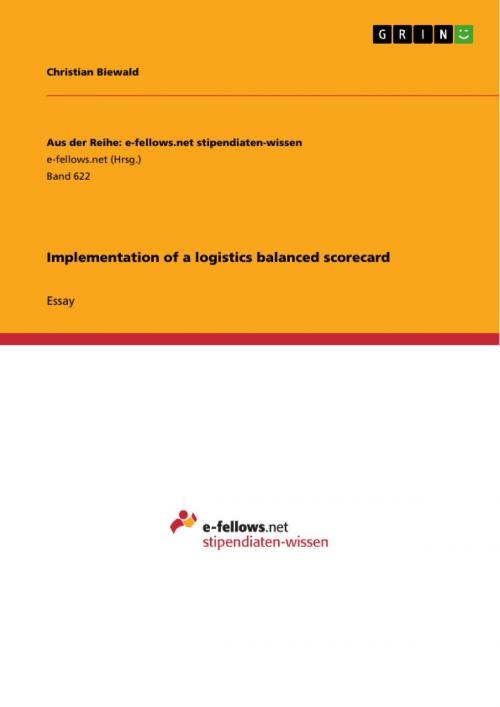Implementation of a logistics balanced scorecard
Business & Finance, Management & Leadership, Production & Operations Management| Author: | Christian Biewald | ISBN: | 9783656356394 |
| Publisher: | GRIN Publishing | Publication: | January 22, 2013 |
| Imprint: | GRIN Publishing | Language: | English |
| Author: | Christian Biewald |
| ISBN: | 9783656356394 |
| Publisher: | GRIN Publishing |
| Publication: | January 22, 2013 |
| Imprint: | GRIN Publishing |
| Language: | English |
Essay from the year 2013 in the subject Business economics - Supply, Production, Logistics, grade: 1,0, University of Applied Sciences Kempten (Professional School of Business and Technology Kempten), course: Strategic Logistics Management, language: English, abstract: In future industry competition will be increasingly 'supply chain vs. supply chain', rather than 'firm vs. firm'. So today, the efficient management of global supply chain networks already has the potential to create competitive advantages for companies. Nevertheless most industrial companies still focus on production efficiency, creating non-market oriented business solutions that disable fast adaption to changing customer requirements. In more and more saturated markets a technology-driven competitive advantage is often quickly compensated by low-cost countries. In contrast high service quality established by efficient logistics processes can hardly be adopted in short time. The ability of fast consumer response allows companies to create an added value the customer is willing to pay for. But empowering companies to offer this added value requires high management attention on logistics processes as well as a clear logistics strategy with defined objectives that meet the company's abilities and the customer requirements. Several management tools like the Supply Chain Operations Reference (SCOR) model or the Balanced Scorecard provide a structured approach to realize competitive advantages in the management of supply chains. After a short theoretical survey of these tools, a suitable logistics balanced scorecard will be developed for the supply chain activities of Diehl Controls, an electronics manufacturer for home appliances. Based on the company's logistics mission and vision statement, internal and external strategic objectives will be determined. In a further step, the controlling of these objectives will be ensured by creating suitable performance indicators. Finally the Diehl Controls logistics balanced scorecard will be introduced to the company's organization. The term paper ends with a recommendation of future developments and enlargements of the balanced scorecard related to the company's growth within the next years.
Essay from the year 2013 in the subject Business economics - Supply, Production, Logistics, grade: 1,0, University of Applied Sciences Kempten (Professional School of Business and Technology Kempten), course: Strategic Logistics Management, language: English, abstract: In future industry competition will be increasingly 'supply chain vs. supply chain', rather than 'firm vs. firm'. So today, the efficient management of global supply chain networks already has the potential to create competitive advantages for companies. Nevertheless most industrial companies still focus on production efficiency, creating non-market oriented business solutions that disable fast adaption to changing customer requirements. In more and more saturated markets a technology-driven competitive advantage is often quickly compensated by low-cost countries. In contrast high service quality established by efficient logistics processes can hardly be adopted in short time. The ability of fast consumer response allows companies to create an added value the customer is willing to pay for. But empowering companies to offer this added value requires high management attention on logistics processes as well as a clear logistics strategy with defined objectives that meet the company's abilities and the customer requirements. Several management tools like the Supply Chain Operations Reference (SCOR) model or the Balanced Scorecard provide a structured approach to realize competitive advantages in the management of supply chains. After a short theoretical survey of these tools, a suitable logistics balanced scorecard will be developed for the supply chain activities of Diehl Controls, an electronics manufacturer for home appliances. Based on the company's logistics mission and vision statement, internal and external strategic objectives will be determined. In a further step, the controlling of these objectives will be ensured by creating suitable performance indicators. Finally the Diehl Controls logistics balanced scorecard will be introduced to the company's organization. The term paper ends with a recommendation of future developments and enlargements of the balanced scorecard related to the company's growth within the next years.















